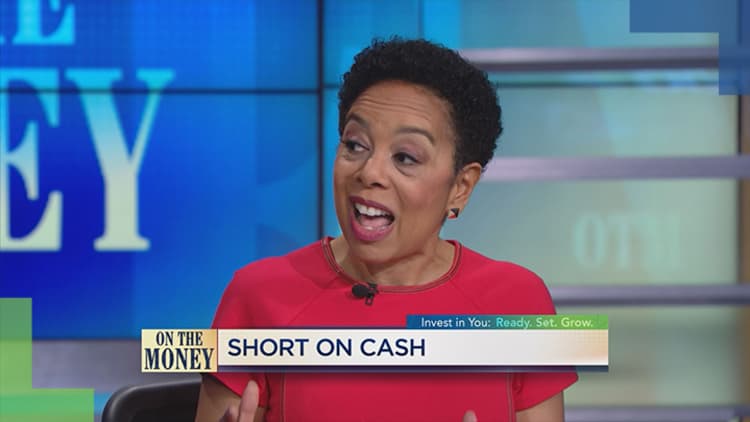When it comes to shoring up your retirement savings, "work longer" isn't always the right answer.
There's no denying that staying at work has its perks.
For instance, employees who are 50 and older can defer the maximum $19,000 into a 401(k), plus the catch-up contribution of $6,000 this year.
In addition, pre-retirees can boost their retirement income by opting to remain in the workforce a little longer. For each year you delay Social Security, up until age 70, you get an 8% increase in your benefit check.
But not everyone can continue to punch in — and those who curtail their careers due to health conditions take a hit to their retirement security.
People may not be aware that Social Security offers disability insurance, but going through it to get those payments is a long process.Niv Persaudcertified financial planner at Transition Planning & Guidance
Indeed, 3 out of 4 Americans aged 65 and over have multiple chronic conditions, which can include diabetes, high blood pressure and arthritis, according to the Centers for Disease Control and Prevention.
These ailments threaten older people's finances when they are forced to cut their hours or stop working altogether.
A recent study from Mathematica's Center for Studying Disability Policy found that newly disabled workers in their 50s and early 60s see their earnings decline by an average of 50% two years after they develop their condition.
"People don't think about disability being a possibility; they think about short-term medical bills," said Josh Nelson, a certified financial planner and founder of Keystone Financial Services in Loveland, Colorado.
A crimp on earnings

The Mathematica study examined 3,105 individuals who were born between 1931 and 1947, following them over the course of about 20 years.
About 14% of the participants experienced a work-limiting health condition by age 59.
Another 12% of the people surveyed reported such a condition by age 63, and another 10% said they experienced this by age 67.
The study found that individuals who experienced these health problems were more likely to exit the workplace early.
For instance, at age 59, participants with conditions that affected their work were about 2.5 times more likely to stop working, compared to healthier peers.
Though federal disability and retirement benefits help affected workers to make up for some of their lost earnings, it doesn't fully replace what those workers were making, the study found.
Disability coverage
Social Security's disability insurance provides infirm workers with a financial backstop in the event they're no longer able to earn a living.
In order to qualify, you must have been working for at least 10 years. However, younger workers may qualify for benefits with less time.
Here's the catch with Social Security disability coverage: Qualifying for it is very difficult.
More from Personal Finance:
Consumer watchdog sues two credit-repair firms
Older workers haven't seen a raise. Here's why
Here's how motherhood affects your income
There's a five-question process the agency uses to vet applicants, including determining whether the condition is so severe that it keeps an individual from performing any work.
Even if you do qualify for Social Security disability, you won't receive benefits until the sixth full month after the date your condition began.
"People may not be aware that Social Security offers disability insurance, but going through it to get those payments is a long process," said Niv Persaud, a certified financial planner at Transition Planning & Guidance in Atlanta.
Bolstering income
Nobody ever anticipates becoming disabled, but there are steps you can take prior to a health emergency to protect your income.
That starts with purchasing disability insurance, either individually if you run your own business or at work through your employee benefits package.
Standard disability coverage generally replaces up to 60% of your earnings for specified period of time.
The benefits generally run for three to six months for short-term disability plans, or they can last for as long as five years or up to age 65 for long-term disability coverage.
Insurance companies also offer supplemental disability insurance to help cover additional income needs that might otherwise not be covered by your standard disability policy.
An emergency fund can also help fill in the gaps.
How your proceeds are taxed will vary based on who's paying the premiums.
If your employer pays, any benefits you receive will be taxable.
Employees who pay for coverage using after-tax dollars will get their benefits tax-free. However, if they pay the premiums with pretax money, then their benefits are taxable.
Dig into the details
Be sure to read the fine print of your plan. Often, people filing a long-term disability claim have to wait anywhere between 30 days to 90 days before receiving benefits.
During that so-called "elimination period," you'd need to tap your emergency fund and short-term disability benefits to cover your expenses.
Further, know how your policy defines "disability." Some plans require that you be unable to perform the duties of any occupation in order to be considered disabled and eligible for payments.
The alternative is an "own occupation" plan, where benefits kick in once you're unable to perform the duties of your specific line of work.
"Make sure you have a policy that defines disability as not being able to do your own occupation," said Nelson. "'Any occupation makes it hard to get those benefits."


